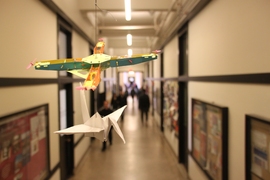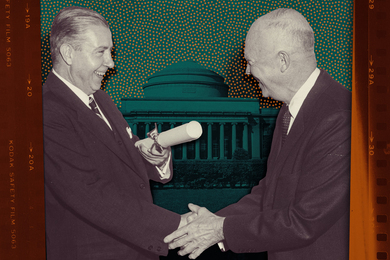When it comes to graduate student life, what happens in the lab often stays in the lab.
The MIT Graduate Student Admissions blog is trying to change that narrative, post by post. The blog grew out of an Independent Activities Period (IAP) writing workshop held in 2017, which was so successful it was offered again this year.
Lauren Stopfer, a third-year graduate student in biological engineering who attended the inaugural workshop and now serves on the blog’s editorial board, says “the blog was started to provide a window into the reality of MIT grad life,” like the “grind” of research, moments of epiphany, and even surviving winter in New England.
This inside look has attracted a strong readership of around 5,000 views per month. The blog is written for people considering graduate school, current students at MIT and elsewhere, and anyone seeking a view beyond the Infinite Corridor. Since its inception, the site has steadily evolved in terms of its range of topics, the number of posts, and even its purpose.
Stopfer says the blog became a lifeline over the past year. Having a platform was a way for her to be “a little freer” and to find her voice on topics ranging from cheap vacations to the proposed tax on graduation tuition.
Two of her fellow bloggers and editorial board members echo that sentiment. Jared Kehe, a third-year student in biological engineering, wrote a recent post expressing his love of coffee: “For our generation, coffee is practically a deity. We worship it, ritualize it, love it. We believe in coffee.“ Leigh Ann Kesler, who is in her sixth year in nuclear science, posted a poignant piece on a longtime lab mate moving on. “I can see the blessings of my friendships, and how my life has been enriched by the diversity of my relationships without dwelling on the sadness that comes from parting ways,” she wrote.
A quick survey of posts reveals several common themes among MIT graduate student bloggers: food, managing failure, and figuring out the maze that is MIT (especially for those outside of the U.S.).
Diana Chien, program director of the MIT School of Engineering Communication Lab and one of the blog’s champions, says it’s been “amazing to watch the blog take hold.”
“Even better, for the workshop this year, those who started off learning how to blog are now running things and teaching tips and tricks to their fellow graduate students,” Chien says.
The IAP writing workshop is practical at heart. Much of the advice to future bloggers is broadly applicable, ranging from "just write (and then revise, revise, revise)," to understanding narrative patterns, to convincing grad students to get outside their customary academic writing comfort zones and be more conversational.
In addition to the seasoned bloggers, staff communicators from around MIT served as teachers, hands-on mentors, and editors. Anne Stuart, a communications officer in the electrical engineering and computer science department and a teacher, writer, and editor, shared her 13 go-to tips. Many of them are no-brainers, she says, but they trip up even professional writers, such as “be concise” and “avoid ambiguity.”
Martha Eddison, who writes extensively in her role as the special assistant to President L. Rafael Reif, shared her own trade secret: The most important word in each sentence goes at the end.
The poster advertising this year’s course promised, tongue-in-cheek, that those who participated might find fame and fortune, in addition to polishing up their writing acumen. In fact, a few of the posts have been picked up by outside media such as the Times Higher Ed Supplement.
Other fans of the blog are closer to home. Vice Chancellor Ian Waitz, who kicked off the idea for the graduate blog about two years ago, said that MIT’s administrative leaders often discuss particular posts.
“It helps us, as we might read about issues that are concerning to students, and ones that we might not have otherwise been aware of,” he says. “The blogs paint a portrait of the whole graduate student — beyond research, their families, their day to day.”








